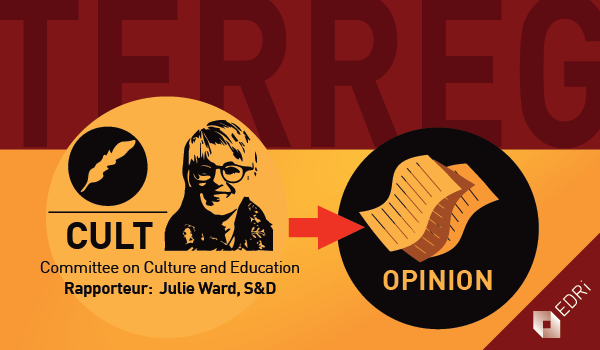CULT: Fundamental rights missing in the Terrorist Content Regulation
The European Parliament (EP) Committee on Culture and Education (CULT), published on 16 January its Draft Opinion on the proposal for a Regulation preventing the dissemination of terrorist content online. Member of the European Parliament (MEP) Julie Ward, the Rapporteur for the Opinion, has joined Rapporteur for the IMCO Committee Felix Reda MEP, and civil rights group in criticising many aspects of the Commission original proposal. The Rapporteur expresses her concerns regarding threats for “fundamental rights, such as freedom of expression and access to information, as well as media pluralism.”
In the Draft Opinion, CULT proposes a number of changes:
- Definition of terrorist content: The Opinion suggests aligning the definition of terrorist content with the Terrorism Directive 2017/541/EU and to carve-out educational, journalistic or research material.
- Definition of hosting service providers: The CULT Committee acknowledges that the definition of these services is “too broad and legally unclear”, and that many services which are not the target of this Regulation would be unnecessarily covered. The Rapporteur suggests covering only those hosting service providers that make the content available to the general public.
- Removal orders: According to the Opinion, the only authorities competent to issue removal orders should be judicial authorities, since they are the ones with the “sufficient expertise”. Furthermore, the “one hour” time frame to respond to the removal orders is replaced by “without undue delay”. This would allow for more flexibility for smaller service providers.
- Pro-active measures: The obligation of pro-activity (in practice, to implement upload filters in hosting services) is deleted from the proposal.
- Finally, the Rapporteur suggests removing the financial penalties in order to avoid smaller providers being overburdened, as well as to prevent the likely scenario “where companies may overly block and remove content in order to protect themselves against possible financial penalties.”
This constitutes, on a general level, a very welcome improvement of the dangerous pitfalls of the Commission’s original proposal. Of particular relevance is the Rapporteur’s assessment that an imposition of proactive measures would amount to a breach of Article 15 of the e-Commerce Directive (which contains the prohibition of general monitoring obligations), as well as the proposed deletion of pro-active measures (upload filters). However, it is unclear how the addition by the Rapporteur in Art. 3 (2) saying that hosting service providers “shall not store terrorist content” could be put in place without upload filters, even if as a safeguard the Rapporteur asks those measures to be “appropriate”.
Another shortcoming of the Draft Opinion is the lack of concern about the highly unaccountable instrument of providing referral capacities to national authorities. For some reason, the Rapporteur has decided not to address this trojan horse, which would directly implement privatised law enforcement in the European Union. Referrals from national authorities, even though with their intent to be just for “voluntary consideration” by private companies, are likely to become the way that pervasive Governments outsource the protection of Freedom of Expression to unaccountable private companies, who are outside of the scope of the Charter of Fundamental Rights.
Even though the Rapporteur has not addressed all of the key issues, there are many positive suggestions in the Draft Opinion. Some of them are in line with the IMCO Committee Draft Opinion, which provided an even more comprehensive proposal for improvement. Given the criticism from both Committees, three UN Special Rapporteurs and a large number of civil society groups, the lead committee, the Civil Liberties (LIBE) Committee, is expected to take all of this criticism on board and comprehensively amend the Regulation.

Draft Opinion of the Committee on Culture and Education on the proposal for a regulation on preventing the dissemination of terrorist content online (16.01.2018)
http://www.europarl.europa.eu/sides/getDoc.do?type=COMPARL&reference=PE-632.087&format=PDF&language=EN&secondRef=01
Terrorist Content Regulation: document pool
https://edri.org/terrorist-content-regulation-document-pool
Terrorist Content: IMCO draft Opinion sets the stage right for EP (18.01.2019)
https://edri.org/terrorist-content-imco-draft-opinion-sets-the-stage-right-for-ep/
Terrorist Content Regulation: Warnings from the UN and the CoE (19.12.2018)
https://edri.org/terrorist-content-regulation-warnings-from-the-un-and-the-coe/
The EU Council’s general approach on Terrorist Content Online proposal: A step towards pre-emptive censorship (11.12.2018)
https://edri.org/the-eu-councils-general-approach-on-terrorist-content-online-proposal-a-step-towards-pre-emptive-censorship/
Terrorist Content Regulation: Civil rights groups raise major concerns (05.12.2018)
https://edri.org/terrorist-content-regulation-civil-rights-groups-raise-major-concerns/
Terrorist content regulation – prior authorisation for all uploads? (21.11.2018)
https://edri.org/terrorist-content-regulation-prior-authorisation-for-all-uploads/
(Contribution by Diego Naranjo, EDRi)
